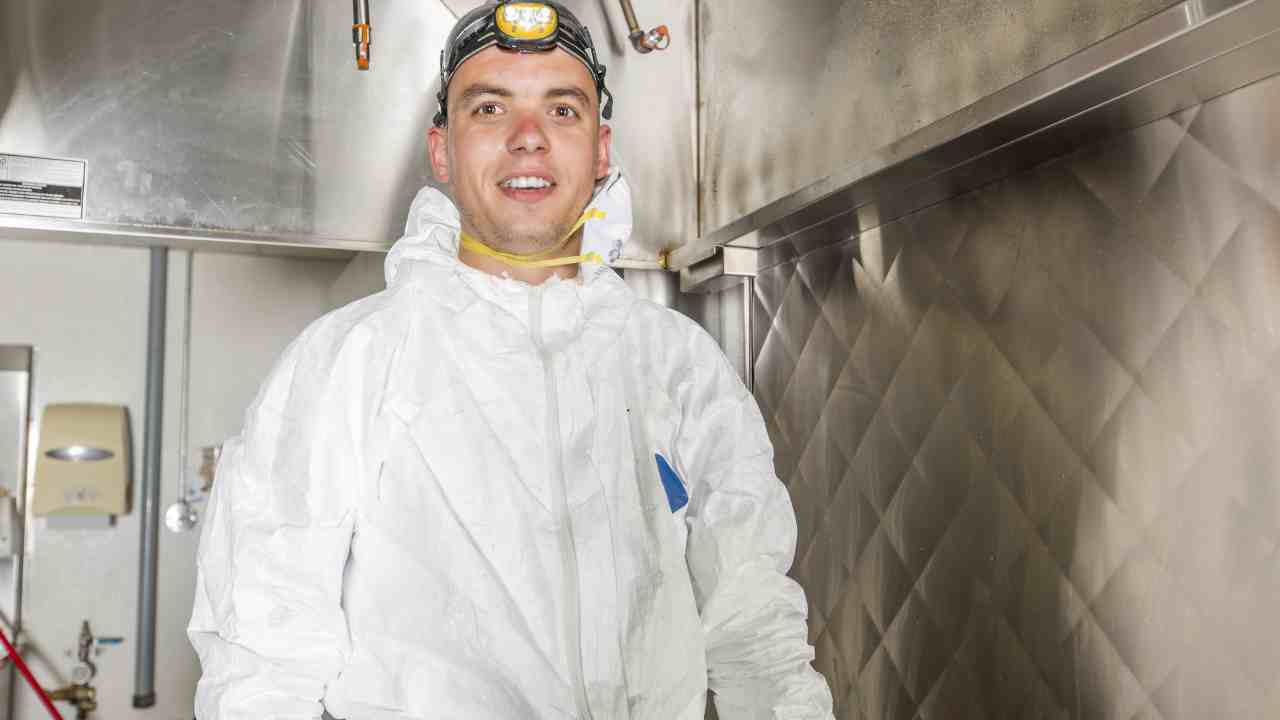Reasons to Clean Kitchen Exhaust System

The kitchen exhaust system plays a crucial role in maintaining a clean and safe environment in any commercial kitchen. It is responsible for removing smoke, grease, and other airborne contaminants that are generated during cooking. However, many restaurant owners and managers often overlook the importance of regular cleaning and maintenance of their kitchen exhaust systems. In this article, we will explore the reasons why it is essential to clean the kitchen exhaust system regularly and the potential consequences of neglecting this crucial task.
1. Fire Prevention
One of the most critical reasons to clean the kitchen exhaust system is fire prevention. Grease and oil buildup in the exhaust system can become a significant fire hazard. According to the National Fire Protection Association (NFPA), nearly one-third of all restaurant fires are caused by grease buildup in the exhaust system. These fires can quickly spread throughout the entire kitchen and even the entire building, resulting in extensive damage and potential loss of life.
Regular cleaning of the kitchen exhaust system removes the grease and oil buildup, reducing the risk of fire. By keeping the system clean, restaurant owners can significantly minimize the chances of a devastating fire breaking out in their establishment.
2. Improved Air Quality
A clean kitchen exhaust system also contributes to improved air quality in the kitchen. During cooking, various pollutants such as smoke, steam, and odors are released into the air. If these contaminants are not properly removed, they can accumulate and create an unhealthy working environment for kitchen staff.
By regularly cleaning the kitchen exhaust system, these pollutants are effectively removed, ensuring that the air in the kitchen remains clean and safe to breathe. This not only benefits the health and well-being of the kitchen staff but also enhances the overall dining experience for customers.
3. Compliance with Health and Safety Regulations
Another crucial reason to clean the kitchen exhaust system is to comply with health and safety regulations. Health departments and fire inspectors often require restaurants to maintain a clean and functional exhaust system. Failure to comply with these regulations can result in fines, closure of the establishment, or even legal action.
Regular cleaning and maintenance of the kitchen exhaust system demonstrate a commitment to maintaining a safe and hygienic environment for both employees and customers. It also ensures that the restaurant remains in compliance with all relevant health and safety regulations.
4. Energy Efficiency
A clean kitchen exhaust system is more energy-efficient compared to a dirty one. When the exhaust system is clogged with grease and debris, it has to work harder to remove smoke and odors from the kitchen. This increased workload leads to higher energy consumption and increased utility costs.
By regularly cleaning the kitchen exhaust system, the system can operate at its optimal efficiency. This not only reduces energy consumption but also extends the lifespan of the equipment, saving restaurant owners money in the long run.
5. Extended Lifespan of Equipment
Regular cleaning and maintenance of the kitchen exhaust system can significantly extend the lifespan of the equipment. When grease and debris accumulate in the system, it can cause corrosion, rust, and other damage to the exhaust hood, ductwork, and fans.
By removing the buildup of grease and debris, the kitchen exhaust system can function properly, reducing the risk of damage to the equipment. This extends the lifespan of the system, saving restaurant owners from costly repairs or premature replacements.
6. Prevention of Unpleasant Odors
A dirty kitchen exhaust system can contribute to unpleasant odors in the kitchen and throughout the restaurant. The accumulation of grease and debris in the system can create a breeding ground for bacteria and mold, resulting in foul smells.
Regular cleaning of the kitchen exhaust system eliminates the source of these odors, ensuring that the kitchen and dining areas remain fresh and inviting. This enhances the overall dining experience for customers and helps maintain a positive reputation for the restaurant.
7. Improved Fire Insurance Coverage
Insurance companies often require restaurants to have a clean and well-maintained kitchen exhaust system to provide fire insurance coverage. Neglecting regular cleaning and maintenance of the system can result in insurance claims being denied in the event of a fire.
By ensuring that the kitchen exhaust system is regularly cleaned and maintained, restaurant owners can maintain their fire insurance coverage and have peace of mind knowing that they are adequately protected in case of a fire-related incident.
Regular cleaning and maintenance of the kitchen exhaust system are essential for several reasons. It helps prevent fires, improves air quality, ensures compliance with health and safety regulations, enhances energy efficiency, extends the lifespan of equipment, prevents unpleasant odors, and maintains fire insurance coverage. Neglecting this crucial task can have severe consequences, including the risk of fire, fines, closure of the establishment, increased utility costs, and damage to the restaurant’s reputation. By prioritizing the cleaning and maintenance of the kitchen exhaust system, restaurant owners can create a safe, healthy, and efficient working environment for their staff and provide an enjoyable dining experience for their customers.
Learn more about “How to clean kitchen exhaust system” right here.
Frequently asked questions about Reasons to Clean Kitchen Exhaust System

Why is it crucial to clean the kitchen exhaust system regularly, and what are the main reasons behind this maintenance?
Cleaning the kitchen exhaust system regularly is crucial for several essential reasons. Firstly, grease, oil, and other contaminants accumulate in the exhaust hood, ductwork, and fans during cooking operations. Over time, this buildup becomes highly flammable, increasing the risk of kitchen fires. Regular cleaning helps remove these flammable substances, reducing the potential for fire hazards and promoting a safer kitchen environment.
Secondly, a clean kitchen exhaust system improves ventilation efficiency. When the exhaust system is clogged with grease, airflow is restricted, causing appliances to work harder and increasing energy consumption. Cleaning the system enhances airflow, resulting in better ventilation, cooler kitchen temperatures, and reduced strain on kitchen equipment.
Additionally, regular cleaning improves air quality within the kitchen and the surrounding areas. Grease-laden particles released during cooking can become airborne and spread unpleasant odors. Proper cleaning helps eliminate these odors and ensures that the air remains fresh and free from cooking contaminants.
Lastly, keeping the exhaust system clean is essential for complying with health and safety regulations. Many local and national authorities require commercial kitchens to maintain clean and safe exhaust systems to ensure the well-being of employees and customers. Failure to comply with these regulations may result in fines, penalties, or even closure of the establishment.
How often should a kitchen exhaust system be cleaned, and what factors determine the frequency of cleaning?
The frequency of cleaning a kitchen exhaust system depends on several factors, and there is no one-size-fits-all answer. As a general guideline, most commercial kitchens should have their exhaust systems professionally cleaned every three to six months. However, several factors influence the frequency of cleaning.
One crucial factor is the volume of cooking conducted in the establishment. High-volume restaurants and busy commercial kitchens may require more frequent cleaning to prevent excessive grease buildup. The type of cooking and the menu items prepared can also influence cleaning frequency. For instance, kitchens that use solid fuels like wood or charcoal tend to produce more grease and may need more frequent cleanings.
Additionally, compliance with local health and safety regulations is essential in determining the appropriate cleaning schedule. Some authorities may specify the minimum frequency for cleaning kitchen exhaust systems based on the establishment’s size, cooking volume, and menu items.
Can you explain the potential consequences of neglecting regular cleaning of the kitchen exhaust system?
Neglecting regular cleaning of the kitchen exhaust system can lead to several potential consequences, all of which can have severe impacts on the establishment and its occupants.
One of the most significant risks is the increased likelihood of kitchen fires. Grease and oil buildup in the exhaust system are highly flammable, and a spark or high temperature can easily ignite the accumulated grease, causing a rapid and dangerous fire that can spread through the ventilation system and beyond.
Aside from the fire hazard, a neglected kitchen exhaust system can negatively affect kitchen efficiency. Restricted airflow due to grease buildup causes appliances to work less efficiently, leading to increased energy consumption and higher utility costs. The reduced ventilation may also cause an uncomfortable working environment for kitchen staff due to elevated temperatures and poor air quality.
Furthermore, ignoring regular cleaning can result in non-compliance with health and safety regulations. Health inspections by local authorities may uncover a dirty and unsafe exhaust system, leading to penalties, fines, or even forced closure of the establishment until the issue is rectified.
What are the signs that indicate a kitchen exhaust system needs immediate cleaning?
There are several signs that indicate a kitchen exhaust system requires immediate cleaning.
Firstly, if the exhaust hood surfaces are visibly covered in grease and grime, it’s a clear indicator that cleaning is overdue. Grease buildup on the hood and surrounding surfaces is not only unsightly but also poses a significant fire risk.
Another sign is the presence of persistent and unpleasant cooking odors in the kitchen and other areas of the establishment. If the exhaust system is not effectively capturing and venting cooking contaminants, it’s a sign that cleaning is necessary to improve airflow and ventilation.
Reduced performance of kitchen equipment can also signal the need for cleaning. If the stovetop burners are not heating as efficiently as before or the oven seems to take longer to cook food, it may be due to restricted airflow caused by a dirty exhaust system.
Lastly, if employees or customers complain of eye irritation, coughing, or breathing difficulties while in the kitchen or dining area, it could be a result of poor indoor air quality caused by a clogged exhaust system.
Are there any benefits beyond safety and compliance in regularly cleaning the kitchen exhaust system?
Yes, regular cleaning of the kitchen exhaust system offers several additional benefits beyond safety and compliance. A clean and efficient exhaust system contributes to a more pleasant working environment for kitchen staff. With better ventilation and reduced cooking odors, employees will experience improved comfort and productivity.
Furthermore, a clean exhaust system can positively impact the reputation and image of the establishment. A tidy and well-maintained kitchen not only instills confidence in customers but also enhances the overall dining experience.
Cleaning the exhaust system also extends the lifespan of the equipment, reducing the need for premature replacements and costly repairs. By keeping the system in good condition, establishments can save money on maintenance and equipment replacement costs.
Additionally, a well-maintained exhaust system contributes to energy efficiency. Unobstructed airflow allows kitchen equipment to function optimally, reducing energy consumption and lowering utility bills.
Overall, regular cleaning of the kitchen exhaust system ensures a safer, more comfortable, and cost-effective kitchen environment, benefiting both the establishment and its customers alike.
- hood cleaning
- kitchen exhaust cleaning
- Reasons to Clean Kitchen Exhaust System
- restaurant hood cleaning







